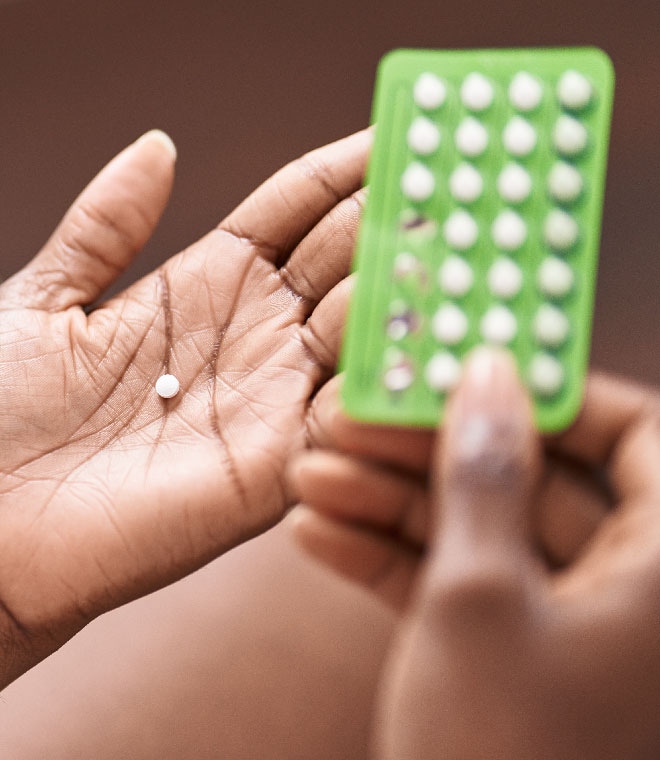Health
Can you be pregnant and still have a period?
By Patricia Ann Convery, MD, Fellow, American College of Obstetrics and Gynecology Jul 20, 2023 • 7 min
Missing a menstrual period is often one of the earliest signs of pregnancy. However, you may wonder if missed periods always occur during pregnancy, especially when you see anecdotes online about people menstruating all the way through the third trimester.
Can you get your period during pregnancy?
You can’t get your period during pregnancy. However, it is possible to experience vaginal bleeding while you’re pregnant.
Your period is a part of your menstrual cycle, a series of hormonal changes that prepare the body for pregnancy. Around halfway through your menstrual cycle, one of your two ovaries releases an egg that could become fertilized by a man’s sperm. In addition, the lining of your uterus thickens, so it can accommodate the egg if fertilization occurs.
When pregnancy doesn’t happen, your body sheds the excess uterine lining, and the menstrual cycle starts over. The shed tissue and blood is the discharge you experience during your menstrual period. By definition, a woman only menstruates when she’s not pregnant.
What are the potential causes of vaginal bleeding during pregnancy?
Although vaginal bleeding during pregnancy isn’t uncommon, it may be an indication that something is wrong. The following are some of the causes of vaginal bleeding during pregnancy.
Implantation bleeding
After an egg gets fertilized, it becomes implanted in the lining of the uterus. Sometimes, this results in spotting, known as implantation bleeding. The color of the blood is usually pink or brown, and it’s light enough that a panty liner is typically adequate. In most cases, implantation bleeding is harmless and stops within a few days.
Miscarriage
A miscarriage is the loss of a pregnancy before 20 weeks. Most often, it happens when there are chromosomal problems with the embryo or fetus. Spotting and light bleeding can be the first signs of an impending miscarriage. It can occur in the form of light spotting or heavier flow. Other symptoms of a miscarriage include cramping, the passage of tissue through the vagina, a release of clear or pink liquid through the vagina, dizziness and lightheadedness. Women experiencing a miscarriage should contact their healthcare providers right away.
Ectopic pregnancy
In a typical pregnancy, a fertilized egg becomes implanted in the uterus. If the fertilized egg implants elsewhere, an ectopic pregnancy occurs. Most often, ectopic pregnancies happen in one of the two fallopian tubes that connect the ovaries to the uterus.
The fallopian tube is not designed to accommodate a growing embryo and may become irritated and overstretched. An ectopic pregnancy is a life-threatening condition that can eventually cause the fallopian tube to rupture. It requires emergency treatment.
Vaginal bleeding is a common symptom in women with an ectopic pregnancy. Due to the risks of an ectopic pregnancy, bleeding in early pregnancy needs to be evaluated to confirm whether the pregnancy is a normal intrauterine pregnancy.
Subchorionic hemorrhage
The placenta is an organ that develops during pregnancy to supply oxygen and nutrients to the growing fetus. The chorionic membrane is a part of the placenta. During some pregnancies, blood forms between the uterus and this membrane, resulting in vaginal bleeding.
Subchorionic hemorrhage is the cause of about 10% of cases of bleeding during pregnancy. The heaviness of bleeding can range from light spotting to a heavy flow. A small number of women with a subchorionic hemorrhage experience cramping along with bleeding. It's also possible to have a hemorrhage without experiencing any bleeding. When this happens, the hemorrhage is usually detected during a routine ultrasound. Women diagnosed with a subchorionic hemorrhage will usually have a follow-up ultrasound to confirm that the hematoma is going away rather than enlarging. Many women with a subchorionic hemorrhage in early pregnancy go on to have healthy, full-term pregnancies.
Sexual activity
Most women can safely continue with sexual activity during pregnancy. However, sexual intercourse and foreplay that includes vaginal penetration can sometimes cause irritation. When this occurs, a pregnant woman may experience spotting, which typically resolves on its own.
Placenta previa
During pregnancy, the placenta can implant over any surface on the uterus, although typically the implantation is higher up. When the placenta implants too low, it can cover or closely approach the cervix, leading to a condition called placenta previa.
Painless, bright red vaginal bleeding that happens during the second half of pregnancy is the most common symptom of placenta previa. The condition is usually diagnosed at the time of your anatomy scan ultrasound around 20 weeks of pregnancy. In many cases, the bleeding comes and goes. When bleeding occurs due to placenta previa, medical care is necessary to protect both the mother and baby during the remainder of pregnancy and delivery.
Placental abruption
If the placenta separates from the uterus during pregnancy, it’s known as a condition called placental abruption. Vaginal bleeding is the most common symptom of placental abruption, and in some cases, the bleeding is severe enough to pose a risk to the mother. Placental abruption is usually associated with cramping pains or contractions. Like placenta previa, placental abruption requires medical care.
What to do about vaginal bleeding
If you know you’re pregnant and you’re experiencing vaginal bleeding, let your healthcare provider know rather than trying to self-diagnose. Your provider can conduct an examination and run tests to determine if there is a problem and then recommend treatments as needed.
If you’re not pregnant and you’re getting a period, there are a number of feminine care products in addition to menstrual pain relief products that can help.
Published July 2023.
Sources:
- https://kidshealth.org/en/teens/period-pregnancy.html
- https://my.clevelandclinic.org/health/diseases/9687-ectopic-pregnancy
- https://my.clevelandclinic.org/health/symptoms/24536-implantation-bleeding
- https://my.clevelandclinic.org/health/diseases/9688-miscarriage
- https://my.clevelandclinic.org/health/diseases/9435-placental-abruption
- https://my.clevelandclinic.org/health/diseases/24211-placenta-previa
- https://www.mayoclinic.org/healthy-lifestyle/getting-pregnant/in-depth/symptoms-of-pregnancy/art-20043853
- https://medlineplus.gov/ency/patientinstructions/000614.htm
- https://health.ucdavis.edu/obgyn/services/family-planning/early_miscarriage.html
- https://www.womenshealth.gov/menstrual-cycle/your-menstrual-cycle
- https://my.clevelandclinic.org/health/articles/10132-menstrual-cycle
- https://my.clevelandclinic.org/health/symptoms/23511-subchorionic-hematoma
- https://my.clevelandclinic.org/health/body/22337-placenta




